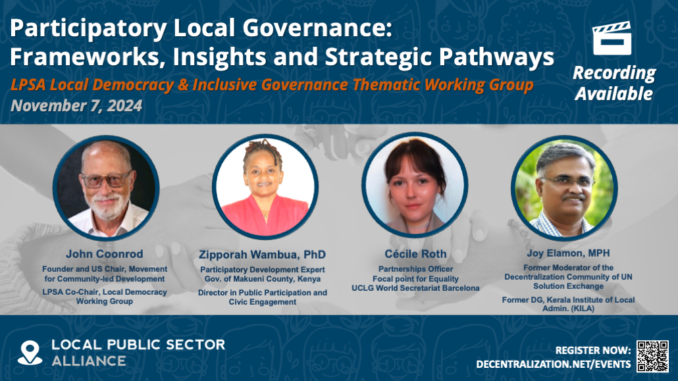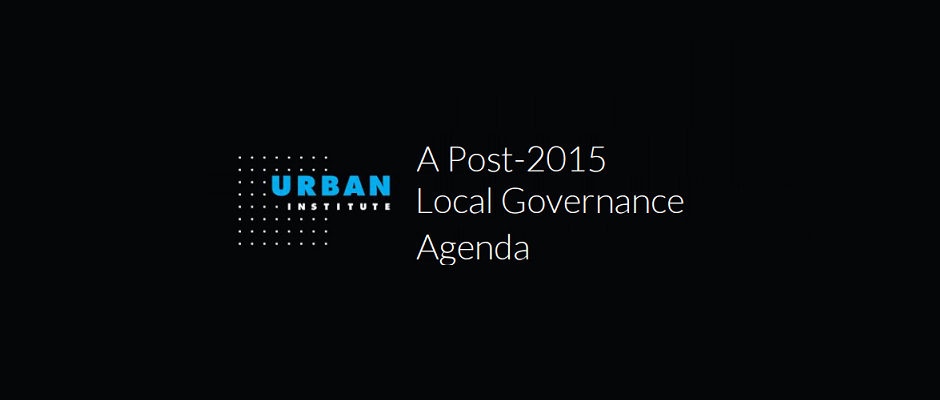
The Local Public Sector Alliance’s (LPSA) Local Democracy, Inclusive Governance and Community-led Development open meeting was held on November 7, 2024 (8:00 AM ET). The meeting was led by LPSA Co-Chair John Coonrod, Strategic Advisor, The Hunger Project; Founder and US Chair, Movement for Community-led Development. John opened the session by introducing it as part of a series organized by thematic working group of the Local Public Sector Alliance with aim of these sessions to create a practical work plan for driving inclusive governance and strengthening local democracy.
Joy Elamon, Former Moderator, Decentralization Community of UN Solution Exchange & Former Director General, Kerala Institute of Local Administration (KILA) shared his extensive 28-year experience with the People’s Plan Campaign, a transformative decentralization initiative in Kerala. This campaign empowered local governments to develop their own plans, manage budgets, and assume new functions, creating a more participatory approach to governance. Elamon highlighted Kerala’s success in local governance, including the creation of a local indicator framework for SDG localization and an innovative poverty identification process. Through participatory methods, communities identified 64,000 extremely poor families, leading to tailored micro-plans that helped lift 38,000 families out of extreme poverty. Elamon also discussed the vital role local governments played during crises, such as the COVID-19 pandemic, and in responding to climate change.
However, he noted the challenge of managing rising citizen expectations, which often surpass available resources, and the complexities of land relations, which can affect the success of participatory planning. Despite these challenges, Elamon emphasized that participatory governance has greatly improved service delivery in Kerala, fostering more inclusive and equitable development.
Zipporah Wambua, a Participatory Development Expert from Makueni County, Kenya, has been a key advocate for decentralization and local governance. Her work ensures that county governments adhere to devolution laws, empowering communities and promoting inclusivity. Inspired by her visit to India, Zipporah helped decentralize administrative units in Makueni by establishing sub-county and village-level offices to strengthen participatory budgeting and community action plans. This approach has significantly boosted local democracy and accountability.
Zipporah shared the success of participatory budgeting in Makueni, where local communities identify priorities and integrate them into the county budget. By 2019, 20% of the county’s budget was decentralized to be managed locally, allowing communities to oversee key projects such as water access and healthcare. While challenges like limited funding and varying community priorities remain, participatory budgeting has increased transparency and fostered active citizen engagement in decision-making and monitoring government spending. Zipporah emphasized that this approach has brought about meaningful improvements in sectors like healthcare, water access, and climate change action, demonstrating the powerful impact of local participation.
Cécile Roth, Partnerships Officer at United Cities and Local Governments (UCLG) shared the organization’s commitment to decentralization and local democracy. Roth emphasized the importance of local governments in promoting sustainable development and gender equality, especially through participatory processes that empower marginalized groups such as women and youth. She also highlighted the award-winning “Utopias” program in Iztapalapa, Mexico City, which focuses on community-driven projects for social inclusion and poverty reduction, such as schools, health centers, and urban gardens. These initiatives demonstrate the power of citizen involvement in shaping public policies and improving community well-being.
In addition, Roth addressed the urgency of responding to the climate crisis and its potential impact on governance models. She cautioned that the climate emergency could lead to authoritarian approaches to governance, stressing the importance of local democracy in maintaining resilience and ensuring democratic systems remain strong in times of crisis.
The meeting also featured other contributions from attendees who discussed the successes and challenges of participatory governance in their regions. Jamie Boex emphasized the significant benefits of participatory local governance, drawing attention to Kerala’s success in implementing localized governance practices. He pointed out that Kerala provides three times more health services without increasing costs, showcasing the potential for cost-effective service delivery through participatory governance.
Boex argued that such examples could be used to advocate for the broader adoption of participatory governance by highlighting its value for money. He suggested that quantifying the impact—such as offering better healthcare at a lower cost—could help shift the conversation from emotional or moral arguments to data-driven appeals, especially in a policy environment where evidence and cost-effectiveness often carry more weight. This insight highlighted the importance of framing participatory governance not just as a moral imperative, but as a practical, cost-saving approach to governance that can drive better outcomes for communities.
The panel discussion was followed by an engaging open discussion and Q&A session, where attendees had the opportunity to ask questions and share valuable insights. In his closing remarks, John Coonrod highlighted the LPSA’s commitment to driving positive change in governance. He encouraged attendees to spread the word about the upcoming event within their networks, advocating for a shift from autocratic tendencies to a more inclusive, bottom-up approach—one that values human dignity and ensures that the voices of all people are heard in decision-making processes. To close the meeting, John provided details about the next quarterly meeting, scheduled on February 6, 2025, and motivated the attendees to continue the conversation.
A video of the meeting is available on Youtube. The links below provide access to the video segments of the different agenda items.
| Agenda Item | Contributor |
| Welcome & Introduction | John Coonrod Local Democracy & Inclusive Governance Working Group Co-Chair Founder & US Chair, Movement for Community-led Development |
| Presentation 1 | Joy Elamon Former Moderator, Decentralization Community of UN Solution Exchange & Former Director General, Kerala Institute of Local Administration (KILA) |
| Presentation 2 | Cécile Roth Partnerships Officer, Focal Point for Equality, United Cities and Local Governments (UCLG), World Secretariat Barcelona |
| Presentation 3 | Zipporah Wambua Participatory Development Expert, Government of Makueni County, Republic of Kenya, Director of Public Participation and Civic Engagement |
| Group Discussion & Moderated Q&A | Participants Moderated by John Coonrod |
| Closing Remarks & Next Steps for the Working Group | John Coonrod |
The next Local Democracy Working Group open meeting is scheduled on February 6, 2025 – Register Here.
Reminder: You can join any LPSA Expert Working Group free of cost and receive reminders and updates by opting-in to one or more working groups as part of your LPSA Membership registration.



